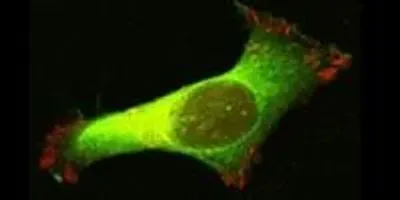 Microscopic image of the enzyme DPP9 at work in liver cellCredit: Centenary Institute
Microscopic image of the enzyme DPP9 at work in liver cellCredit: Centenary Institute
By blocking a widespread enzyme, Centenary researchers have shown they can slow down the movement of cells and potentially stop tumours from spreading and growing.
Using a new super-resolution microscope they’ve been able to see single molecules of the enzyme at work in a liver cancer cell line. Then they’ve used confocal microscopes to see how disrupting the enzyme slows down living cancer cells.
The enzyme is DPP9 (dipeptidyl peptidase 9) which the researchers at the Centenary Institute and the Sydney Medical School were first to discover and clone, in 1999. Ever since they’ve been studying what it does, with a view to its possible use as a cancer drug target.
“It was exciting to be able to watch the enzyme at work and then block DPP9, and see the cells slow down,” says A/Prof Mark Gorrell from Centenary’s Molecular Hepatology unit. “This gives us our clearest evidence yet that this enzyme will be a good cancer drug target.”
“What this work has shown us is that this enzyme is absolutely critical to cell movement, and without cell movement, tumors can’t grow or spread,” says Gorrell of the work, published in the the leading European cell biology journal BBA Molecular Cell Research.
Using the recently acquired super-resolution microscope, Ms Hui (Emma) Zhang—one of Gorrell’s PhD students— determined where individual fluorescently tagged DPP9 molecules were located inside cells. She found that DPP9 lies on the microtubules that play a significant role in intracellular transport and in cell migration.
When cells were stimulated to move, Zhang discovered DPP9 accumulates at the leading edge of the moving cell. DPP9 was also associated with the adhesion protein complex that glues the cell to the external matrix though which it moves, acting as an anchor point to pull the cell along. When the action of DPP9 was inhibited in cells, such movement and adhesion diminished.
“DPP9 is looking more and more like a cancer drug target. But at present we have no specific inhibitors for it, even though chemists have been trying for some years to make one.” he said. “We need to throw more resources at this problem.”
During the past 15 years, Gorrell has been unveiling the properties of DPP9, which belongs to a small family of four enzymes specialised in cleaving other proteins. Members of this family modify and regulate proteins for many important functions inside and outside of cells. DPP4, for instance, is already the basis of a leading drug treatment for diabetes. DPP4 inhibitors are worth about $6 billion a year and comprise about a quarter of the diabetes drug market.
“The roadblock to developing a specific inhibitor for DPP9 has been that it is very similar physically, but not functionally, to DPP8. It has been hard to distinguish between the two chemically,” Gorrell says. He is now working on determining and publishing differences between the two enzymes, which should help chemists target their efforts better.
“This is our first paper to be generated using this new microscope, which we acquired in collaboration with Sydney University with the help of the Ramaciotti Foundation,” the Executive Director of the Centenary Institute, Prof Mathew Vadas AO says. “It is a great illustration of the value of the latest microscope imaging technologies to medical research.”













